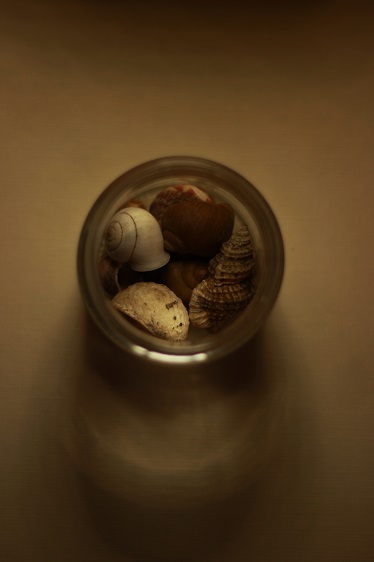
Shabd
Memory is a china shop of fragilities
where porcelain, glass, skin, resolve, and other
things prone to breaking easily
reside, either showcased or tucked away
within shelves and the concealment of mahogany
drawers. I’ve known now, what—two, three,
maybe four languages? Beyond the two
mother tongues, it’s happenstance and conjecture,
sure, but for the sake of arithmetic assimilation,
let’s go with three, three-and-a-half, or
thereabouts. And yet it’s the same familiar
handful of letters and their phrasings I turn to, in
those moments that send the heart
fluttering like the maddest of mad dervishes,
limbs flailing for the legitimacy of birth.
Main theek hoon. I am okay. Kya baarish
shuru ho chuki hai? Has it begun to rain?
Chalo, kuch chai peene ke liye nikalte hain. Come,
let’s head out for some tea. Within the quadrants
of these syllables, you’d be forgiven for
accommodating life. ‘Global temperatures have
risen by nearly four degrees.’ Main theek hoon.
‘Climate change is not a figment of some idiot’s
imagination.’ Kya baarish shuru ho chuki hai?
‘Who knows what tomorrow will bring.’ Chalo,
kuch chai peene ke liye nikalte hain. I await
the flood. The oceans have risen,
the continents have split; across tropics,
the forever shadow, that if there is
a farther horizon, at the end of it, does there
rest the providence of a word? ‘I used to
love you like I loved the sea.’ Main theek hoon.
‘I wept that day those whales washed onto
our shores.’ Kya baarish shuru ho chuki hai?
‘I don’t even remember flavour.’ Chalo,
kuch chai peene ke liye nikalte hain. I could
talk to you of love and other such things
that come draped in the organza of a
faraway past. I could take shelter in the myths
that humans stitch into the fabric of
their preordained lives. ‘Do you think
you’ll ever be a better man?’ Main theek hoon.
‘Perhaps love has a way of seeping through
the cracks.’ Kya baarish shuru ho chuki hai?
‘Ever think you’ll recognise the signs?’ Chalo,
kuch chai peene ke liye nikalte hain. Chalo,
kuch chai peene ke liye nikalte hain…
On a Street in Lisbon
A couple skips past the human traffic
on a street in Lisbon, steering their child
in a stroller, as he lays there, accumulating
the uncomplicated arithmetic of dreams.
I’m struck speechless, for a minute or so,
by the nobility of life on view.
Firstly, there’s the nobility of god, destiny,
faith, and all those other delicious things
you’re never quite sure you should capitalise
or not having conspired, in a sense, to send
these two human beings crashing into the
path of previously parallel lives.
Then there’s the nobility of the child,
this thing trying to figure out its arms
and legs, leave alone the world,
not knowing that in its crystal clear
innocence, it is laying down a gauntlet
against the darkness, saying—
You, I know you exist and I know
you’re there, and I know that forests
are burning and the oceans are rising
and the din is deafening, but I need
you to know that I am here— a drop
of light, an elixir of hope.
There’s nobility, too, in the parents
having decided to ignore fear and hatred
in this epoch of fear and hate. The nobility
of letting the world’s ills wash over them
like fleeting sitcom laughter. Of them
dancing with the forever dream.
And finally there is, I guess,
the nobility of me—drinking
everything down as though it were
manna, coaxing out of life these
words and characters, brewing from
them this paean of belief.
I suppose what I’m trying to say
is—keep skipping.
Life, Like Wildfire
Let’s form our gatherings here, now, in this
tiny speck within the epochal volume
of human history. The lovers we’ve had,
the love we’ve made. Kisses shared
on balconies drenched in blood moons.
The frolicking of perfume, sent out into
the enigmas of this many darks. The thrum
of limbs on the sand in a sort of coastal
disco, each wave commensurate with
the ache of rush. Let’s form our gatherings
—the illnesses, the heartaches, the added
up glory of so many heartbeats. Let’s leave
regret aside, there isn’t enough time.
Plans, desires, and daydreams for the future
can all be filed away under ‘Whimsy’,
in that same shelf where we store aside
children’s ideas of unicorns and lands made
up entirely of chocolate. Let’s gather
the cities we’ve known—the tremble
of breath on a night thick with charisma
in Lisbon; luscious undulations of prayer
on a fulsome Isfahan dawn; floods of jazz
and yearning when Bombay gets that way;
Paris, preening via the sins of its lost
chanteuses and haunted poets. Let’s gather
this conception of home—lived out in
Poona, dappled with love and childhood
and words and unseen faith; lived out in
those cities where the windows looked out
at hope and other reassuring vistas. Let’s
form our gatherings here, now—there
may be no more cities or poems or skin
or kiss or caress or sip or taste or flourish;
there may be no more lines of earth
and smell of rain and unexpected postcards
and the song that erupts, like wildfire,
across the northern hills. There may be
no more of any of that, for a while,
a while longer. Let’s form our gatherings
here. Let’s find in them the dance of life.
Let’s salsa with them, one hand supporting
the waist, and marvel that we were able
to have even this much. Let’s generate
hope and compassion for this yawning
void ahead, sure, but here, now, let’s form
our gatherings—from when we were alive,
whispering to the wind, drunk on daiquiris
and mirages of love, adrift, entirely human.




